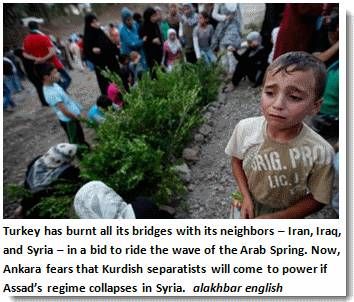| « Conduct unbecoming a Presidential candidate | Mitt Romney's gaffes abroad show that his numbers just don't add up » |
Turkey Pays the Price for Supporting Regime Change in Syria
It is well known that the situation in Syria would not have reached this point if it was not for Turkey’s political and military support of the Syrian opposition.
By: Hüsnü Mahalli alakhbar english
August 9, 2012 Creative Commons
(Turkey: Running its Own Gauntlet)
 Turkey has burnt all its bridges with its neighbors – Iran, Iraq, and Syria – in a bid to ride the wave of the Arab Spring. Now, Ankara fears that Kurdish separatists will come to power if Assad’s regime collapses in Syria.
Turkey has burnt all its bridges with its neighbors – Iran, Iraq, and Syria – in a bid to ride the wave of the Arab Spring. Now, Ankara fears that Kurdish separatists will come to power if Assad’s regime collapses in Syria.
Istanbul - From the onset of events in Syria, Ankara has displayed relative caution in its relationship with Tehran. But now that the government of Recep Tayyib Erdogan has joined a “Sunni front” with Arab gulf countries, Ankara is being more direct with its Shia neighbor.
Chief of staff of the Iranian armed forces Hassan Firouzabadi recently blamed Turkey, Qatar, and Saudi Arabia for the bloodshed in Syria.
The Turkish government instantly jumped to respond to Firouzabadi’s accusations, and at the same time to remarks made earlier by senior Iranian envoy and chief nuclear negotiator Saeed Jalili while on a visit to Damascus.
First came a declaration from Erdogan, followed by a more explicit position from his foreign minister Ahmet Davutoglu. The latter accused Iran of complicity in Syrian president Bashar al-Assad’s slaughter of the Syrian people.
He said his government “has not and will never support Iran’s policies in Syria,” adding that Ankara did not approve of statements made by Iranian officials. He described the serious differences in perspectives between Iran and Turkey on Syria.These rapid developments came swiftly after violent clashes in the Hakkari province in southeast Turkey between hundreds Kurdistan Workers’ Party (PKK) fighters and the Turkish military. The area was declared a no-go zone, even for the media and members of parliament.
Kurds and Conseqences
The Turkish government accused Syria and Iran of supporting the PKK, although it is widely known that most of the fighters had come in from northern Iraq.
Nevertheless, Turkish officials avoided publicly blaming president of the Iraqi Kurdistan Region Massoud Barzani.
Ankara has high hopes for Barzani in its plans to get rid of the “Shia” government of Nouri al-Maliki in Baghdad, and thus control the situation in the Kurdish regions of north and northeast Syria in case of further deterioration.
Turkish intelligence sources have raised the possibility that the PKK could take control of Kurdish areas in Syria and declare a federal Kurdish entity.
The key to the Turkish-Iranian crisis, however, remains Ankara’s role in Syria. This will continue to impact the region overall, with Turkey joining the “anti-Syrian” camp, while Iran, the Maliki government, and Lebanon, to an extent, standing behind Damascus.
But it is well known that the situation in Syria would not have reached this point if it was not for Turkey’s political and military support of the Syrian opposition.
This support came not long after Syria was on the verge of forming an economic union with Turkey at the end of 2010.
Turkish-Iraqi relations follow a similar pattern. In 2009, the two countries signed a strategic cooperation agreement, strengthening Turkey’s relations with both Syria and Iran on all levels.
This ideological almost-victory had some impact on the ground. Visas between Turkey and Syria, Lebanon, Jordan, Iraq, and Libya were waived, leading to political, economic, social, and psychological breakthroughs in the region in general.
Undoubtedly this made some countries in the Gulf uncomfortable, but the alliance did have initially have the support of Qatar’s emir, Hamad bin Khalifa al-Thani.
It later turned out that he was playing it smart, building relations with Assad and the Iranian leadership, and there was also al-Jazeera’s support for the resistance in Lebanon.
Turkey Sacrifices Successes
But Ankara did not hesitate to sacrifice all these successes. It agreed with Washington on a new role in the region through the “Arab Spring,” and promptly retracted its position against foreign intervention in Libya.
Turkey calculated that it would stand to gain a lot by allying itself with Washington, particularly as the Muslim Brotherhood (MB) was expected to reach power in Egypt, Tunisia, and Libya. But this did not play out.
In Libya, liberals won the elections and the Tunisian al-Nahda had to go into coalition with liberal and secular parties. Then, the Syrian “Sunni” opposition failed to topple Assad’s regime.This led many observers to start wondering about the future of Turkey’s relations with Syria, Iraq, and Iran, especially if Assad remains in power. Not to mention that Erdogan already faces considerable trouble with the PKK and its extensions in Syria, Iraq, and Iran.
Also, it is clear that if the battles in Syria escalate into an all-out sectarian war between Sunnis and Alawis, Turkey will be first country to be affected. Around 3 million Alawis with relatives in Syria live alongside the borders in Antakya, Mersin, and Adana.
But the greatest danger for Turkey is what will become of the Kurdish areas in northern Syria if Assad were to fall. The PKK may very well declare autonomy or a federal entity there.
This is seen by Ankara as a strategic threat to all its calculations. It could be one of the greatest dangers that the Turkish Republic has faced since its creation in 1923.
Countries across the region will also find themselves facing nationalist, ethnic, sectarian, and religious challenges due to the Syrian situation.
This article is an edited translation from the Arabic Edition.
Creative Commons



